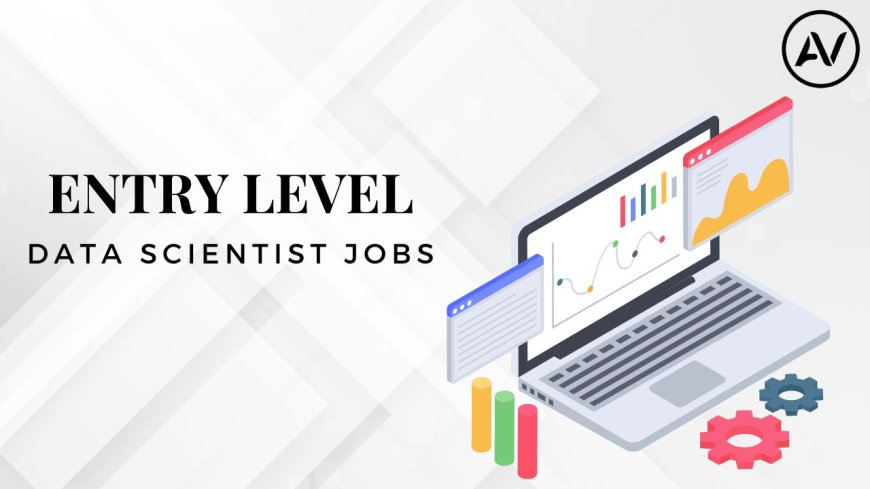The Path to Entry-Level Data Scientist Jobs
Explore entry-level data scientist jobs for beginners finding opportunities, positions, careers, companies, qualifications, skills, salaries, and more.

Entry-level data scientist positions have increased across all industries as a result of the growing demand for data scientists. These jobs are intended for people who have a basic understanding of data science; they frequently look for applicants who are skilled in statistical analysis, machine learning, and programming languages like Python or R. Recognising the wide range of businesses that provide entry-level data scientist jobs is essential to the understanding of these positions. These industries include tech corporations, finance, healthcare, and e-commerce. Employers commonly seek applicants with suitable educational backgrounds in mathematics, computer science, or similar subjects; these credentials are frequently enhanced by real-world experience gained through projects or internships. Even though certain entry-level positions may be referred to as data analytics or data science engineers, they typically involve identical duties, like gathering, evaluating, and interpreting data to help guide business choices. Future specialists in this domain may investigate employment prospects in data analysis positions in diverse industries, utilizing their competencies to make significant contributions to the expansion and novelty of organizations.
Understanding the Role of an Entry-Level Data Scientist
The diverse focus of data science is concerned with making inferences and knowledge from data using a variety of methods, such as data extraction, statistical analysis, and machine learning. It includes gathering, sanitizing, and evaluating data in order to find trends, patterns, and connections that help guide choices and resolve challenging issues in a variety of fields.
Key Responsibilities for Entry-Level Data Scientist Jobs
Data collection: Compile pertinent information from a range of sources, making sure it is accurate and comprehensive.
Data Cleaning: To eliminate errors, missing numbers, and inconsistencies, preprocess and clean the data.
Exploratory Data Analysis (EDA): Investigate the structure and trends in the data by conducting exploratory data analysis, or EDA.
Statistical Analysis: To gain an understanding and verify theories, use fundamental statistical techniques.
Machine Learning Modelling: Construct and put into use simple models for machine learning to solve certain issues or forecast future events.
Data visualization: To successfully communicate findings and insights, and create informative and understandable visualizations.
Collaboration: To comprehend project needs and provide solutions, work together with team members from all disciplines.
Skills Required for Entry-Level Data Scientist Jobs
Proficiency in Programming: Strong knowledge of programming languages such as Python or R for data manipulation and analysis.
Statistical Skills: Understanding of basic statistical concepts and techniques for data analysis.
Data Manipulation: Ability to clean, preprocess, and manipulate data using tools like pandas, numpy, or dplyr.
Machine Learning Basics: Familiarity with fundamental machine learning algorithms and techniques.
Data Visualization: Experience with data visualization libraries such as Matplotlib, Seaborn, or ggplot2 to create visualizations.
Problem-Solving Skills: Ability to break down complex problems, formulate hypotheses, and develop data-driven solutions.
Communication Skills: Strong verbal and written communication skills to convey technical concepts to non-technical stakeholders.
Attention to Detail: Meticulous approach to data analysis and an eye for detail to ensure accuracy in results.
Continuous Learning: Eagerness to learn and adapt to new tools, techniques, and methodologies in the rapidly evolving field of data science.
Tools and Technologies for Entry-Level Data Scientist Positions
|
Task |
Tools and Technologies |
|
Programming Languages |
Python, R |
|
Data Manipulation and Analysis |
pandas (Python), tidyverse (R) |
|
Statistical Analysis |
scipy (Python), stats (R) |
|
Machine Learning Libraries |
scikit-learn (Python), caret (R) |
|
Data Visualization |
Matplotlib, Seaborn (Python), ggplot2 (R) |
|
Database Management |
SQL |
|
Version Control |
Git |
|
Integrated Development Environments (IDEs) |
Jupyter Notebook (Python), RStudio (R) |
This tabular format presents a clear overview of the tasks and the corresponding tools and technologies used in entry-level data scientist positions.
Essential educational background and degrees
Entry-level data scientists typically start with educational backgrounds that emphasize strong quantitative and analytical skills. Here are some common paths:
Bachelor's Degree in Computer Science: Teaches programming, data structures, and algorithms, essential for data analysis.
Bachelor's Degree in Statistics or Mathematics: Focuses on statistical methods, probability, and mathematical modeling, crucial for data analysis and modeling.
Bachelor's Degree in Engineering: Provides problem-solving skills and mathematical modeling expertise, useful in industries like manufacturing or transportation.
Bachelor's Degree in Data Science or Analytics: Offers a comprehensive curriculum covering statistics, machine learning, and data visualization, directly preparing graduates for data science roles.
Bachelor's Degree in Related Fields with Relevant Coursework: Degrees in fields like economics or biology can be relevant if coursework includes math, statistics, or computer science.
Gaining Practical Experience
Internships, Co-op Programs, and Volunteer Opportunities: These give real-world exposure, allowing you to apply what you've learned and connect with professionals in the field.
Personal Projects and Portfolio Development: Work on your own projects to showcase your skills. Building a portfolio of projects demonstrates your abilities to potential employers.
Networking and Mentorship: Connect with professionals for industry insights and guidance. Networking events and mentorship programs can provide valuable advice and help you navigate your data science career.
Where to Find Opportunities for Discovering and Pursuing Entry-Level Data Science Job openings?
Online Job Boards: To look through entry-level data science jobs, use well-known job search engines like Indeed, Glassdoor, or LinkedIn. Use terms like "entry-level data scientist," "junior data analyst," or "data science intern" to focus your search.
Business Career Pages: To find entry-level jobs, check out the career pages of companies you're interested in. Numerous companies list job openings, including internships and entry-level data science employment, directly on their websites.
Networking Events: To connect with professionals in the field, go to meetups, career fairs, and industry events. Through networking, one can connect with future employers, find out about job openings, and learn about business cultures.
Professional Associations and Groups: Get involved with online communities and associations pertaining to data science, such as the Data Science Association or data science groups on sites like Slack or LinkedIn. These discussion boards frequently publish job openings and offer networking opportunities.
University Career Services: Make use of the resources provided by the career services division of your university. They might give networking opportunities, resume seminars, and job listings specifically for students and new grads interested in data science professions.
Alumni Associations: Make use of the alumni network at your university to get guidance, recommendations, and employment openings. Alumni who have gone on to work in data science may be able to provide insightful advice and connections to entry-level positions.
Preparing for Interviews
Technical Interview Preparation: Prepare for data analysis activities and coding problems in advance of your technical interview. Try your hand at solving coding puzzles and manipulating data on sites like HackerRank or LeetCode.
Readiness for Behavioural Interviews: Be ready to answer typical inquiries concerning your background and abilities. Rehearse your answers to questions on your interest in data science, problem-solving skills, and collaboration.
Mock Interview Training: Run through mock interviews with mentors, family members, or friends. This facilitates your comfort level when responding to inquiries and allows you to gain feedback on your answers.
In conclusion, navigating the path to entry-level data scientist jobs requires a strategic approach and persistence. By focusing on acquiring the necessary skills through education, gaining practical experience, and leveraging effective job search tactics, individuals can increase their chances of securing entry-level positions in the field. It's essential to remain motivated and resilient throughout the job search journey, recognizing that setbacks are a natural part of the process. Despite the challenges, the data science field offers exciting opportunities for growth and innovation. Aspiring data scientists should embrace the journey, stay adaptable, and continue to pursue learning and development opportunities to succeed in their careers as entry-level data scientist job seekers.




































